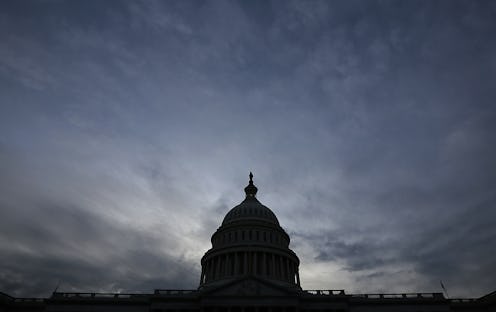News
Here's What A Government Shutdown Will Mean For You

Now that the tax bill has passed Congress, the GOP has to move on to averting a potential government shutdown. Lawmakers in both chambers need to pass a bill by midnight on Friday to keep the government functioning — otherwise much of the federal work force will be furloughed just before Christmas and some services deemed non-vital will be put on hold until more money is allocated. A potential government shutdown may have implications for you, too, but it depends to what degree you rely on them.
A shutdown affects the non-essential parts of government. Things like the post office will continue to function, as will the military, air traffic control, Social Security, and others deemed vital to the country's security and economy. What stops working tends to change from shutdown to shutdown, so it's hard to predict.
But if there are government services that you rely on, know that some of them could come to an end if they rely on yearly budget allocations for funding — though that's different for every single American. One area that you might consider is a visit to a national park; if that was in your holiday plans, you might want to find a better option. The same goes for the National Zoo in Washington, D.C. — the animals will be fine, but it will be closed to visitors.
However, there are other things that are far more serious. During the last shutdown in 2013, the Women, Infants, and Children (WIC) nutrition program went unfunded. So for many mothers trying to buy life-or-death items like baby formula, the government was no help.
If you're a government employee or contractor, this suddenly becomes a lot more dire. If your position is not funded after the shutdown, you could be at home without pay until Congress addresses the matter. In the past, workers are usually made whole with back pay, but there is no guarantee — so paying for things like the Christmas holiday could be difficult.
The government shutdown may still be avoided, but it will depend on whether Republicans can agree on what kind of bill to pass. Particularly in the House, weighing different provisions for ideologically opposed members seemed difficult. But on Thursday morning a bill was proposed by Speaker Paul Ryan, one that offered more funding for the Children's Health Insurance Program (CHIP) and extends a controversial foreign intelligence program.
"We're just bringing a clean, what we call vanilla CR — no games, no sneaky things. Just a continuing resolution to get us through this moment to get us into next year," Ryan said on CNBC's Squawk Box Thursday morning. "It's as clean and simple as possible."
A CR is a continuing resolution. If it passes the House, Senate Democrats could face a difficult decision, and the GOP would need some of their votes to pass the bill in the Senate. They are in a strong position to bargain, but some moderate Democrats in states that Trump won are concerned about angering Trump's base and want to vote for it.
One likely casualty is the passage of a Dream Act before Christmas, something that was seen as a hard line for the party, but may be delayed until January. The bill would offer an ongoing legal status for the thousands of young residents who came to the country as children and until recently were protected by the Deferred Action for Childhood Arrivals (DACA) program. Senators and the White House are working to make it happen in January, but that's not soon enough for many activists.
The government shutdown may not have a huge impact on you personally, but if Republicans fail to come to an agreement, the stalemate could continue through New Year's. With every passing day, it's more likely you'll need one of the affected, non-essential parts of government.